Ego is a motherfucker. At least it can be if you aren’t too careful. I say this as someone whose profession (fantasy author) requires ego to function. You have to be egotistical enough to believe that what you’re putting down on the page is something special enough that someone else (hopefully a lot of someones) is going to want to read. Let that ego consume you though, and your work will suffer. You won’t see the flaws in your writing that need to be improved, you won’t be able to take feedback or apply it to the page. To be a good writer, in my opinion, you need a perfect blend of ego and empathy. Empathy drives good character writing and while folks might come for the story, they stay for the characters. That blend of ego and empathy is something I think about a lot, because it doesn’t maintain balance, it oscillates and you have to be ever vigilant to make sure ego doesn’t tip the scales over.
Like pretty much everyone else, I had a lot of at-home time this past eighteen months and one of the more constructive things I did was rewatch the entire Marvel Cinematic Universe (MCU) in preparation for WandaVision. What struck me throughout was the ways in which ego plays a pivotal role from the very first scene in Iron Man through to the penultimate climax of Avengers: Infinity War and finally, that incredible scene with Tony Stark and Thanos in Avengers: Endgame. I could write an entire series on ego and the MCU, but three heroes really stood out to me in the ways ego did (or didn’t) impact their character arcs and the world around them. Peter Quill, that 80s wannabe-David Hasselhoff meets Kevin Bacon; Wanda Maximoff our sitcom, spell-slinging heroine; and the figure that kicked things off and snapped his fingers on the curtain call: Tony Stark.
I want to start with Tony, because his arc has enough bend in it that it needs a protractor, but let’s take a look at Starlord first. In many ways the two Guardians of the Galaxy films are some of my favorite MCU movies, and fall into the same category as Thor: Ragnarok; they’re essentially straight up comedies in an otherwise dramatic (albeit one known for moments of levity) movie universe. Starlord is funny because he’s such a damned egomaniac and narcissist that he’s completely lost any sense of self awareness, and the rest of the cast lets us know they know he’s an egotistical ass time and again. It’s a fun conceit from the jump, save that Peter gets put into situations that should prompt a change in that self absorption and… they really don’t. He tells everyone how special he is and then learns he is, in fact, special. He’s not just human, but also Celestial—essentially a demigod with massive powers. When he learns this from his father (a dude named Ego, no less) it’s confirmation of what he’s known in his heart of hearts all along. Of course, Ego turns out to be a maniacal monster and repeat fillicider who aimed to eradicate all life save his own. To Peter’s credit, he turns against Ego and with the rest of the Guardians puts an end to this would-be terrorist. Unfortunately, that’s about where Peter’s growth stops. Throughout the rest of his time as Starlord on camera we get some infinitesimal growth, sure, but none of it penetrates the egotistical outer shell that is the Quill in Peter Quill.
I want to try to find some empathy for Peter, but it’s hard. His Mom died before his eyes, he never knew his father (until he did and found him to be a monster), he was abducted by aliens… it’s a lot. I get it. Still, it couldn’t have happened to a bigger narcissist, could it? (Of course, Tony’s backstory isn’t all that dissimilar in some ways and yet he didn’t make the same decisions… put a pin in that folks, we’re coming back to Tony in a minute.) Peter’s Mom told him he was special, the alien that abducted him treated him as his second in command and son for no discernible reason, and his father turns out to be a demigod. Starlord, Peter’s alter ego, is so convinced of his specialness, that he misses reality when it’s staring him in the face, to universal tragic consequence. Don’t believe me? Let’s break it down…
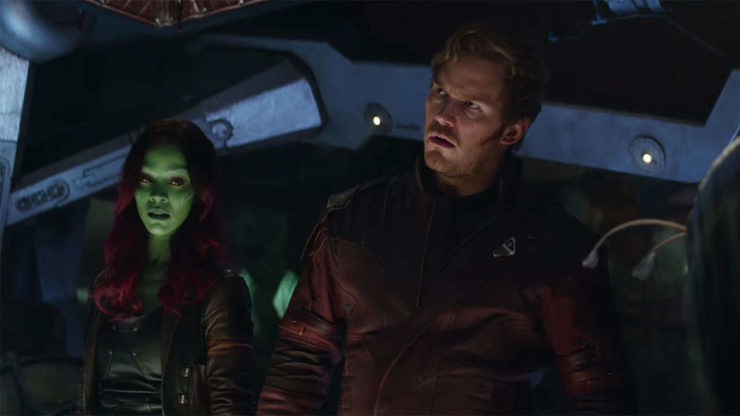
In Avengers: Infinity War Gamora pulls Starlord aside, believing him to have grown enough to handle what she’s about to ask of him. She knows the location of one of the Infinity Stones Thanos seeks and she knows if he is able to read her mind, he’ll find it. Not willing to risk Peter’s safety by spelling things out for him, she makes it clear that she cannot fall into Thanos’ grip or else the universe will be in jeopardy. Forcing Peter to promise to kill her if it comes to it, she leads the Guardians to Knowhere in search of answers. Instead of answers, they find illusions crafted by Thanos and when the Guardians confront the Titan they come out on bottom. There’s a moment, several breaths really, where Starlord can fulfill his promise to Gamora and end her life before Thanos uses it for his nefarious ends. Instead, believing he’s different, special, Peter hesitates and when he’s finally able to bring himself to do the deed: it’s too late…Thanos has bested him.
Later, after Thanos murders Gamora for the Soul Stone, Iron Man, Dr. Strange, Spider-Man, and the remaining Guardians come up with a plan to trap Thanos, remove his gauntlet containing the Infinity Stones he’s stolen, and end his plan for universal decimation. It’s here, where Peter, playing what amounts to a bit part compared to some of the others, shows us he’s still learned nothing. These would-be, ragtag Avengers have got Thanos right where they want him with Mantis putting him in a trance while Iron Man, Spider-Man, and the rest have just about ripped the gauntlet from Thanos’ fist when Peter realizes that Gamora is dead, murdered at Thanos’ hand. His reaction seems reasonable, after all the Guardians of the Galaxy series has shown us their evolution from one-sided infatuation to true caring, but I don’t fully buy it. Especially not for a superhero. Again, rather than realizing that acting solely on his pain, while real, is ultimately selfish, and self-serving, Starlord repeats his mistake of earlier and goes full-on man-child. Waking Thanos from the stupor he’d been put into, Peter lets the Titan escape from the last real chance any of them had to contain him in his growing power.
This raises the question… can superheroes be heroic when their ego gets in the way? Achilles would certainly like us to think so, but at the risk of upending superhero discussions, I’d like to posit that heroism is an act, not a state of being. Peter’s act (while ensuring the rest of the movie still has a story to tell) isn’t heroic and it doesn’t end heroically either. After this Thanos will gain the rest of the Infinity Stones and commit genocide on a scale that boggles the imagination via The Snap. That Peter is one of the ones dusted seems poor recompense for his actions and he dies full of ego believing he’s special, having learned nothing.
Phew. That’s a lot. Let’s flip the script then and look at another character and the influence their ego has on the rest of the MCU.
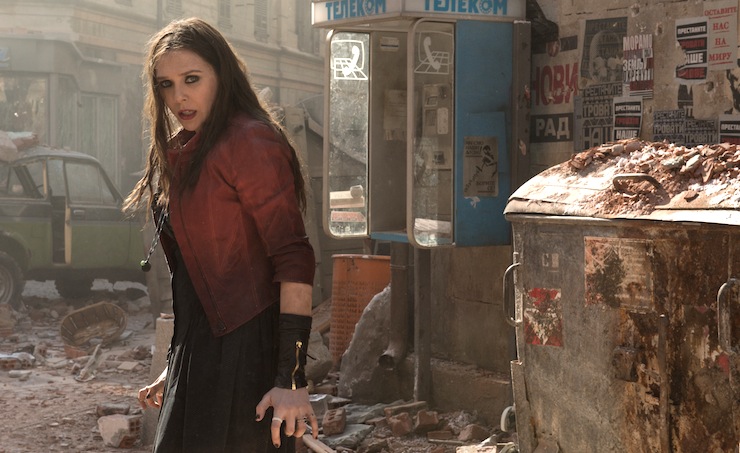
Wanda Maximoff saw her entire world upended by a bomb—several really—but it was the one that didn’t explode, the one with Tony Stark’s name engraved on the side, that set her on a dark path. And really, who could blame her? One moment she’s watching sitcoms and eating dinner with her family and the next she and her brother are trapped in the rubble of their apartment, with the bodies of their now-dead parents, for days. It’s the stuff of nightmares and it’s small wonder that Wanda later joins Hydra, an organization that offers to aid her in taking down Stark and his weapons trade. She does this not only because she thinks Stark is evil, but because she wants revenge; here we see some of the early seeds of ego developing in Wanda as she begins to transform into the Scarlet Witch. When Hydra fails and Ultron comes calling, he confirms everything she (and her brother) believe about Iron Man and the Avengers. Her willingness to join forces with Ultron is intriguing. She’s proven her mettle so she has every right to be confident in her abilities and believe Ultron might need her help in fighting off this superhero attack on her world. It’s tempting to see this as another step in Wanda’s budding ego, but I think this is more about her being misguided—she’s still growing up and learning who she is after all (unlike Quill and Stark who are both adult men). She wasn’t wrong, per se, about Tony’s faults, but she also hasn’t been witness to his ongoing transformation. Ultron confirms everything she believes to be true so of course she buys in; however, when his true motives come to light, she doesn’t hesitate to change sides. This, to me, is the pivotal moment in who Wanda will become. Unlike Peter, she does change, and does so at great personal cost—losing her brother and sole remaining family member—after she’s far, far down a dark path. If Wanda was driven and guided by her ego, she would have doubled down with Ultron; after all he wasn’t trying to kill her the way Peter’s demigod father was. If anything, she had more to fear in betraying him than she did by staying by his side, but instead, she realizes she’s wrong and she flips the script, joining the Avengers to save civilians and right some of those wrongs she’s been an unwitting participant in.
Where Wanda really shines is the years between the defeat of Ultron and Infinity War. She’s shown herself to be one of the most powerful Avengers, yet we don’t see Wanda pushing to the fore looking to show off. Rather the opposite. We see her hanging back, studying the others, being quiet and considering, unafraid to take both advice and orders. We see her building a new life with Vision. All of this is only possible because of the absence of ego. That’s not to say Wanda isn’t confident, but she’s considering. She doesn’t just rush to choose sides in Civil War, and when she does, she does so knowing full well what the costs will be to her. Her character growth pays off in the penultimate MCU film, where she sacrifices everything she’s built with Vision to deny Thanos the final Infinity Stone. Yes, she says goodbye, yes she takes a moment, but it’s not hesitation and when she acts, she does so because she understands there are things in this universe bigger than herself. Destroying Vision is something Peter never could have done and it’s something the old Tony never would have considered. The lesson Wanda took from the tragedy and trauma she witnessed as a child isn’t that she was special because she survived, but rather that life isn’t a guarantee. Her entire arc has built to that moment when she kills the love of her life to save the universe. That Thanos is too powerful by this point to be denied doesn’t diminish her act, but it does lead her to committing her gravest mistake…
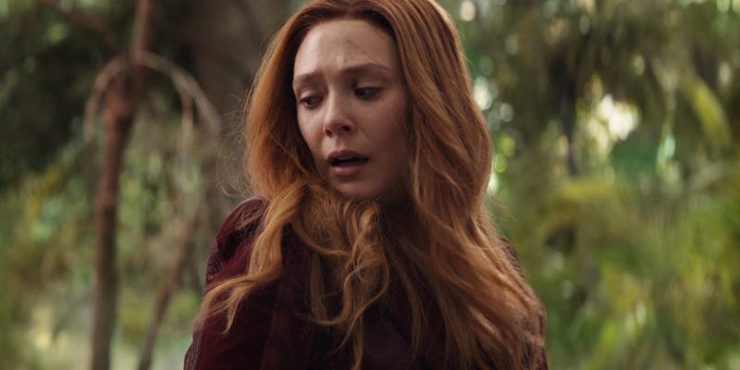
WandaVision is an article unto itself and I’m going to disappoint some readers here by not going deeper, but I don’t think Wanda’s ego was at play in the miniseries. I know, I know, that’s a big statement and maybe I’m letting her off too easily, but I don’t see ego. What I see is a person overcome by grief, losing the last bit of family (found family at that) to her own hand and worst of all: Vision’s death didn’t change a damned thing. Sit with that for a moment. Add to that the lack of support she has in dealing with all of this after Thanos is defeated and it’s the perfect set up to making poor decisions. Those decisions are magnified relative to the amount of power she has, power that she has to believe could (maybe) fix things and in that moment of belief, makes an awful decision that harms thousands. There’s no excuse here, but there are reasons. Like I said, building an argument either way is an article unto itself, but I think Wanda has proven she isn’t an ego-driven superhero. She’s a woman who came from tragedy, who knows what it’s like to be powerless, and who has tried to use her powers (sometimes mistakenly) to right that imbalance. She made a terrible mistake in WandaVision, but when she came to her senses—again already far down a bad path—she turned around, and her story isn’t done yet. If Peter Quill had even twice as much ego as Wanda Maximoff, Thanos would still be out hunting for the Soul Stone with the Avengers and company in hot pursuit.
So we have two opposite examples of ego in the MCU with Starlord, the egotistical and unrepentant and the Scarlet Witch, driven less by ego and more by her desire (not always well-attuned) to do what’s right. That brings us to the character with the biggest arc so far in the MCU and the one with whom we’ve spent the most time, all the way back to the original Iron Man. I’d give a wrestling announcer-like introduction, save Tony Stark would love that too much. This is another one that could be its own series, dissecting the growth of Mr. Stark from Elon Musk-like billionaire playboy to superhero with a savior complex to suspicion of superhero autonomy to reluctant warrior and ultimately… the kind of hero willing to lay down his life that others might live. It’s a pretty incredible arc, one that deserves more attention than I’m going to give it today, but I do want to draw attention to those key moments where Tony’s ego shifts and the ultimate payoff that allows… one that the original character in Iron Man never would have been capable of.
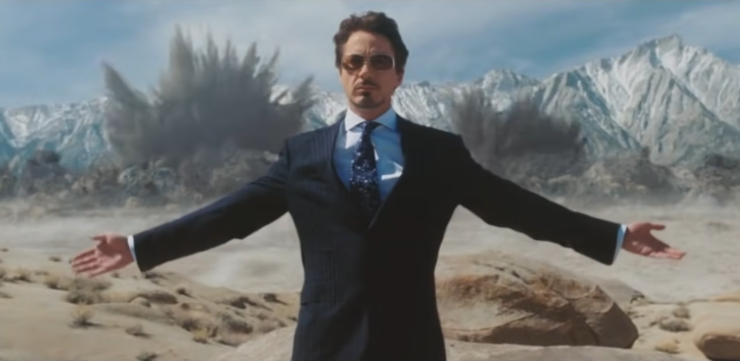
When we first meet Tony Stark he really is the stereotype of an egomaniac. Even being kidnapped and nearly murdered in tandem with the realization that his weapons are being sold to the highest bidders regardless of morality (hint: morality is often inversely related to the killing potential of the weapon being used) isn’t enough to fully shake off that billionaire playboy mentality. It takes events in The Avengers—where Stark sees New York City decimated, innocent lives destroyed, and in the climactic end battle nearly dies himself, frozen in space—for Tony to lose much of (I think all would probably be asking too much given where the dude started) his ego. Key to this are several other factors. First, there’s his relationship with Pepper Potts which has a few facets we should unpack. Pepper likes Tony, but she doesn’t need him in the same way he needs her. We can see this over the course of the movies as she begins to run the company and push back against some of his decisions, challenging him to change or else (and at one point that “else” is her walking away when he doesn’t uphold his side of the relationship). This challenge, along with his personal growth makes him want to be a better partner for her and also gives him personal stakes beyond himself. Second, there’s his growing relationships with fellow superheroes that help him to understand he’s not alone and if he is special, so are a lot of others. There’s his relationship with Bruce Banner based upon each other’s prodigious intellect where he cedes the floor to Banner several times. In the first Avengers movie, Tony also takes a step back and let’s Cap call the shots and lead the team. There’s also a subtle relationship between Iron Man and Black Widow, two heroes looking for redemption (Iron Man: “We create our own demons.”; Black Widow: “I’ve got red in my ledger. I’d like to wipe it out.”). Finally, the lingering PTSD that’s been building since Iron Man 3—where Tony displays classic symptoms such as inability to sleep, panic attacks, etc.—and his near-death experience open Tony to the idea that it isn’t all about him. Still, as I said at the top of this piece, ego is a motherfucker, as tricksy as Loki themself. Even when you recognize it, you can’t always recognize how deep the tendrils go. Tony is driven to create a power that could protect the world (in the face of his PTSD, it seems likely the attraction here was so he wouldn’t have to do so himself). But ego being what it is, Tony doesn’t create a power that protects, but rather one that seeks to destroy: Ultron.
It’s Age of Ultron that truly shatters Tony’s ego… it doesn’t remove it, but it fragments when he realizes that his hubris nearly brought about the very thing he hoped to prevent (I’ll note that I think this is his interpretation, but also fear and untreated mental illness played into his decision making… not an excuse, but mitigating factors worth considering). It’s fitting that Tony’s biggest moments of change come from facing his greatest mistakes. Initially when seeing what his weapons business did to innocent people, experiencing that destruction first hand, and then again with creating Ultron and nearly destroying humanity. This leads to a bit of an over-correction on Tony’s part: He knows he can’t trust his ego and extends his egoism unfairly to all superheroes, but takes it a step further by putting the responsibility in the hands of others rather than himself when he signs onto the Sokovia Accords and kicks off the events in Civil War. (Author note: I am on Cap’s side here, but we’ll set that aside for now.) This is another critical juncture for Mr. Stark—a time when he recognizes that his ego and hubris are fundamental parts of himself that must be taken into account. Beyond that, he realizes he’s not the only one with great power and he seeks to contain their egos as well through the Accords. It’s around this time that relationships also play a critical role in Tony’s development. First, there’s a sundering of his relationship with Pepper Potts and second, there’s a mentoring relationship begun with Spider-Man. Tony’s arc is more pronounced than the others because of how much time we get to spend with him, but I’m struck by how similar he and Starlord’s stories are, with the difference being that Stark has a modicum of self awareness that leads to change and Quill does not. The Iron Man of Infinity War would have winced and then smiled sardonically at the Stark in Iron Man… in fact the way he treats Starlord gives us a good indication of how such a time travel-y scene might have looked.
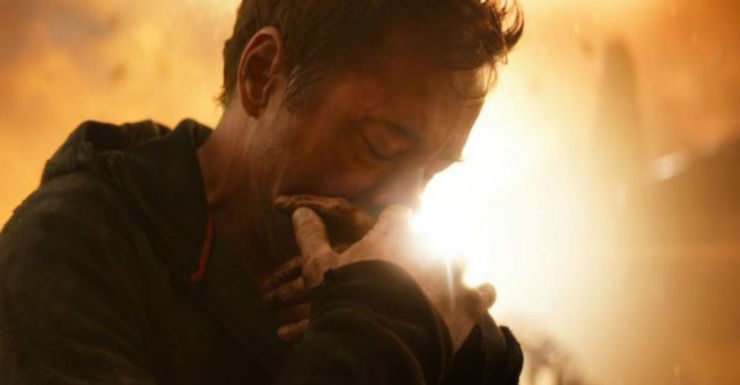
The final evolution of Tony Stark is of the parental figure willing to sacrifice his happiness to preserve the happiness of those he loves. I think it’s losing Spider-Man to The Snap that does it, but also finding his way back to Pepper Potts because he’s no longer so bent on maintaining his aura of infallibility. I wish the movies had spent more time on their relationship here, because I think it’s pretty critical and does a lot to refute some of the lies of toxic masculinity. It’s only when Tony taps into his emotions, allows himself to be vulnerable, and strives to make himself worthy of another person’s love that he is truly ready for a relationship. The Hulk aside, every Avenger is left broken after losing Infinity War… every Avenger save Iron Man. Iron Man no longer, Tony is now a father for real and clearly quite in love with it all. I think it’s that love for another, for several others, that allows him to come back for the events of Endgame despite having the most to lose. By this point Tony Stark has gone from arrogant playboy to true hero, embodied by the fact that he doesn’t believe he can fix things on his own. He’s not even sure the remaining Avengers, together, can fix anything, but he’s willing to try. I don’t think Iron Man ever stops believing he’s special, and I don’t know that we can fault him there, but he’s a hero who knows viscerally there are limits to his powers and yet, at the end of it all, Tony Stark is willing to blast past those limits, damn the consequences. Certainly not for himself, but because he understands there are things bigger than himself worth fighting for. That we should all be so brave.
So, there you have it, my friends. I think superhero stories are, at their heart, allegories. Sometimes of warning, sometimes of example, sometimes of hope and this one is no exception. I don’t know that the writers of the MCU set out to create some sort of grand moral allegory, but I do believe we can all take something from the story they’ve put together. I know that I’d rather a world where we believe everyone is special and worthy of consideration, where it’s never too late to choose a new path, and a world where we’re all willing to sacrifice something, even our lives, for others.
Ryan Van Loan is a debut Fantasy author who served six years as a Sergeant in the United States Army Infantry (PA National Guard) where he served on the front lines of Afghanistan. His forthcoming novel, The Sin in the Steel was purchased by Tor Books publication as a series.










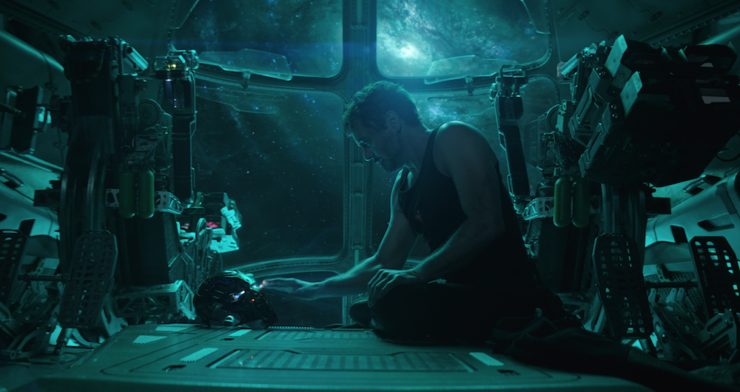
So, in defence of Starlord, just because the author of this article seems to have it in for him.
I don’t see him as particularly egotistical. I see his bluster as more over-compensation. He’s a frightened child trying to look big, he’s a teenager bragging he can down 20 pints of beer. He’s immature, not a narcissist with a god complex. The evidence for his ego here.. he hesitates before murdering the love of his life, and he acts irrationally when he finds out she’s dead. I think you’re holding him to an unfair standard.
I agree with Bob. I think you do Peter a disservice.
In many ways, his story and Wanda’s are an even better match than Tony’s and Wanda’s. Yes, he acts (and is) egotistical, but his failure to kill Gamora the instant he had a moment to do so weren’t driven by ego. They were driven by pain at the thought of losing her – almost exactly the same as Wanda’s hesitation to kill Vision. Who wouldn’t hesitate when being asked to kill the person they love. And he DID pull the trigger. Just minutes to late. And his actions on Titan were largely driven by pain and anger which drove him to not consider their potential repercussions – just as you claim Wanda’s were in WandaVision.
So my $0.02 – yes Peter is an extreme egotist, but largely because the comedy requires it. Ultimately it wasn’t Peter’s ego that was the biggest contributor to his failures, it was his inability to control his emotions.
Excellent essay; however, when you mentioned how Tony Stark stared mentoring Peter Parker, you forgot to mention how Tony Stark’s ego about taking responsibility for New York City in the events of The Avengers led to the events in Spider-Man: Homecoming. The scene where Tony Stark tells Peter Parker that he wants Peter to be “better than him,” Stark’s role in what happens with the antagonist is barely mentioned in the movie.
Also, in Peter’s defense, Tony has had a lot more opportunities to grow.
He’s interacting with a whole world, while Peter is mostly going to be interacting with the same four or five other beings, in the cramped quarters of a spaceship.
That leads to very different feedback on your behavior.
While they both act similar because they’re Marvel protagonists, i think Tony Stark and Peter Quill are pretty much opposites. I kind of feel Tony Stark is a big fish in a small pond. His arc is to learn that his actions cause waves. Peter Quill is a small fish in am unimaginably big pond. His arc is to try not to get eaten.
Great article! Yet, I think that Tony Stark never really overcomes his big ego and the dependance on the Iron Man suit. At the very least he struggles with his ego to the very end – and then decides to give Peter Parker the E.D.I.T.H. weapon, which leads to only great things, right? E.D.I.T.H. = Even Dead, I‘m The Hero.
Raising a child with Pepper certainly has the biggest impact on him, but before that happens in Endgame he has an argument with Cap and still insists on the suit of armour around the world. And his idea for that was Ultron. The creation of Ultron led to massive suffering, which he only acknowledged when the mother of one the victims came directly to him.
His acceptance of and the insistence on the Sokovia Accords has very little to do with him being egoless and seeing the wisdom in those accords. His guilt drives him to do that and he violates the accords as soon as they become a hindrance to his heroics. He follows Cap to Siberia and thus fulfills his role in Zemo‘s plan.
And just ask the Vulture and Mysterio what they think of Tony Stark. They do have a point. Tony Stark‘s ego is a villain in the MCU.
I’m with pro-Quill here. Peter Quill thinks himself special as a defense mechanism. He creates a fantasy persona in order to cope with the tremendous loss and disequilibrium that seems to follow him wherever he goes or is taken.
Tony Stark’s ego comes from the fact that he has never wanted for anything growing up and has come to believe that the good life was somehow his due. I myself don’t see much of an arc with him. Each consecutive movie with Iron Man seems to take a different approach to his egocentrism. And let’s be honest…. he never gets anything close to comeuppance-ness. In fact, when things get really bad, he generally seems to have the attitude that he was right all along and that everyone else should have listened to him in the first place. And, of course, he gets go out in blaze of glory….
One of the most interesting choices I think the MCU makes with Tony Stark is how long his legacy–and the NEGATIVE parts of that legacy–linger after his death. Both Spider-Man movies currently out deal directly with how Tony’s choices create more villains, just on a smaller scale than Ultron. While I agree that Tony’s arc from Ego-to-Hero follows roughly what you’ve described here, I think it’s impossible to clean up the butterfly effect Tony’s ego has had since the beginning of the series. A lot of the things that go wrong in the MCU are Tony’s fault, and it’s going to be interesting to see how the MCU continues to grapple with that now that we’re solidly in Phase 4.
Nice article, though I daresay nearly all MCU characters (and some of the filmmakers) fall into the same trap in regards to Tony’s ‘ego’. To my eye, it’s a false front, it’s the armor he built and wore long before Iron Man Mark I. There’s a deleted scene in IM1 where he confides he doesn’t like or feel the dissolute playboy role the world has shoved him into, and it has always seemed to me more like Afghanistan was the wake-up call he needed to push him to do something about it. Yeah, he’s selfish, and sometimes shallow, but the ‘proof Tony Stark has a heart’ goes alllll the way back to the very first scene in IM1, in the hummer with the grunts. A truly egotistical person would have ignored or probably mocked them. Instead, when he’s told the soldiers are intimidated by him, he immediately starts cutting up with them and trying to put them at ease. That’s not the action of a narcissist.
Tony’s support of the accords rises from his recognition that accountability is essential (also, Steve’s comments about the safest hands has to have stirred up the ghost of Obadiah Stane. Blech) I agree with you though that both Tony and Steve were right, and both were wrong. Frankly the whole tangled mess of the MCU boils down to a lack of communication.
I think this is vastly, vastly overrating Tony’s growth. He literally wouldn’t let them use the Infinity Stones to turn back time (I’m sorry, do the math on the number of people who would have come to life in the middle of a freeway/10,000 feet in the air years after their planes landed… if the pilots weren’t also dusted) SOLELY because of his own need to keep his child/the life he built with Pepper.
He essentially wouldn’t help them save the world unless he got to keep what he wanted. Um… if we don’t call that ego (unable to think of anyone or anything beyond your own wants and needs) what do we call that?
I might add that Peter Quill really does change and grow. After he loses Yondu in the second movie, the zinger shows him dealing with a teen Groot, behaving a lot like the teen Peter Quill probably did. Maybe it’s just me, but the look on Peter’s face seems to say “No wonder Yondu threatened to eat me if I was like THIS.”
@@@@@ 10
To be fair though, it wasn’t just his kid. If they turn back time we’re talking around 200 million children wiped from existence (my math is based on the global population growth rate, halved, over five years) and that’s just on earth. I mean, tough choices all around, but one is collateral for correcting someone else’s choice, the other is choosing for some people, entirely innocent children, to just never exist at all. I know which I’d choose.
Responding to the essay:
I’m also on the pro Peter side. Dude, with huge loss and mother issues, pulled the trigger in the end. Didn’t work out, but given the tools he had, he tried. Truth is they were all stupid to go there at all (without calling ahead? C’mon no long distance coms in MCU space?) and given what Gamora knew, she should have told others right away, and/or killed herself/had Mantis wipe it from her mind. Or just gone straight for the stone. Instead she hoped she’d be able to kill Thanos, and if not out play him, have her plan go off before he could stop it. Lotta ego going around in that scenario.
And you are totally going too easy on Wanda, or rather you’re not giving Peter the same consideration you’re granting her. Peter has also lost everything, he’s also suffered (you think his childhood with those pirates was easy? Yondu is all Mary Poppins by the end, but Peter was 10 when he was taken, and almost 40 when they made good, and those guys weren’t called the Ravagers for nothing, hell half the crew murdered the other half when things got rough, you think Peter had it any better?) and he also “killed” his partner for nothing.
I mean he pulled the trigger. Think about that. Think about a hero doing that, and it being for nothing. Just a sick game by the monster who you’re supposed to be able to beat. Then you find out she’s dead. Wanda raged when Vision died, she was just struck down to soon to do anything about it. They both acted out due to grief. And both tried to commit an act of sacrifice in vain because their enemy was too powerful. Both hesitated but then acted. Peter, unthinking of the consequences lashed out emotionally at his enemy at an inopportune time. Wanda mind controlled an entire town, in a horrific act of violation. She put her grief above an entire group of innocents, and tortured them for days. Peter yelled and punched a guy who seconds ago was trying to kill him. I don’t think either of them get a pass, but if Wanda does, Peter sure as hell does. (Also Peter also changes from doing things for himself, to doing things for the good of others. He totally could have just left the Powerstone with the Collector, but upon learning what it does, tries to get it the hell out of there. Admittedly he does still consider selling it.)
I also don’t think it’s fair to not count someone as a hero, because of one failure to meet the standard. I mean, are all the heroic acts of Peter wiped out because of one failure to be heroic? What about Wanda? She didn’t just make a mistake, she almost slipped into outright villainy, mental health issues aside, she did real bad things. But I wouldn’t say she wasn’t a hero, because she’s done the big hero things too. Neither of them wanted to do wrong, but they failed themselves. If heroism is an act, surly a series of heroic acts are not undone by one mistake.
Iron man makes real growth, but he also had the most opportunity, and the benefit of his privileges to do so.